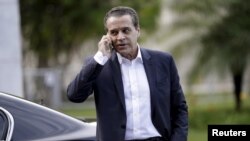Brazil's tourism minister resigned Thursday, less than two months before the country hosts the Olympics, as the government of interim President Michel Temer lost its third minister in a month to a sweeping graft probe of state oil company Petrobras.
Tourism Minister Henrique Alves was one of two dozen officials named in plea bargain testimony by a former Petrobras executive linking Temer and several of his closest allies to Brazil's biggest corruption scandal ever.
While Temer dismissed the accusations as frivolous lies, the latest ministerial resignation underscored the risks that come with the sweeping Petrobras probe, which has thrown Brazil's politics into chaos and deepened its worst recession in decades.
Sergio Machado, a former senator from Temer's party who ran the shipping arm of oil giant Petrobras for over a decade, was the latest in a string of politicians and executives who, when snagged by investigators, have flipped on friends and allies.
He told prosecutors that Alves, who served four decades as a congressman, had solicited 1.55 million reais ($450,000) in campaign funds from the scheme. Machado said the contributions were made legally but resulted from kickbacks owed by engineering companies that received Petrobras contracts.
Alves denied the accusation and said late Wednesday on Twitter that contributions to his campaigns had been made through official channels and declared to election authorities.
Tourism ministry in chaos
His resignation added to recent upheaval at the tourism ministry, where a global marketing campaign for the Olympics was held up for months because of a revolving door of ministers and secretaries caused by Brazil's political crisis.
"I don't want to create embarassments or any difficulties for the government," he said in a letter to Temer provided to journalists Thursday, explaining that he had resigned to focus on defending himself from the accusations.
Temer also dismissed the graft allegations as dishonest and reckless, pledging in a national address Thursday morning that his government would not be distracted from fiscal reforms aimed at reviving the economy.
Temer said it was "irresponsible, ridiculous, mendacious and criminal" to suggest, as Machado did, that he had sought campaign funds for his party from the graft scheme, the first direct link implicating Temer in the scandal.
"We will not tolerate affirmations of that nature," Temer said in a hastily scheduled public address. "A foolish suggestion like that can confound the government's work. But I want to affirm that nothing will hinder our desire, mission and aim of doing what the president must do right now."
Fiscal reform plan
The plea bargain testimony, implicating Temer and senior members of his ruling coalition, stole the thunder from a landmark fiscal reform revealed the same day.
Thursday's newspapers splashed the bribery allegations across their front pages, pushing the government's proposed 20-year constitutional cap on public spending far below the fold.
Machado's plea deal included allegations that Temer had sought campaign funds for his party's 2012 Sao Paulo mayoral candidate from the graft scheme at Petrobras, the biggest ever uncovered in Brazil.
The accusations provide more fodder for suspended President Dilma Rousseff and her allies, who accuse Temer and his party of mounting the impeachment process against her in order to distract from their own roles in the corruption scandal.
Rousseff faces a trial in the Senate on unrelated charges of breaking budget rules.
As many as a dozen of the 55 senators who voted last month to put Rousseff on trial are now undecided, according to surveys by Brazilian media. If just a couple of them change sides, the Temer camp would fall short of the 54 votes — equivalent to two-thirds of the 81-seat Senate — needed to convict Rousseff.
If she is convicted in mid-August, as many analysts still expect, Rousseff will be permanently removed from office and Temer would serve out her mandate until the 2018 elections.





